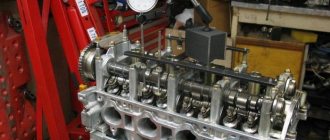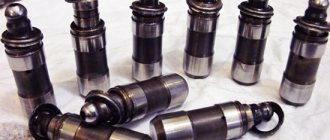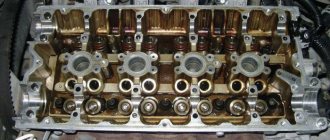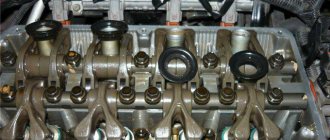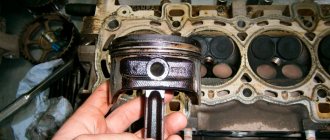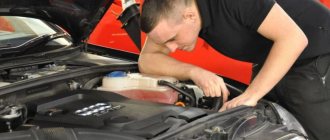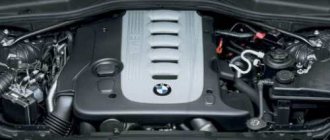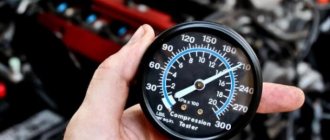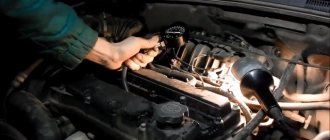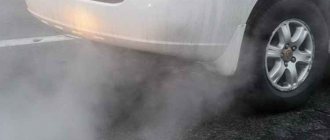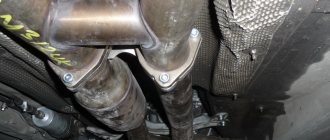Any extraneous noise in a car engine often makes owners feel wary. And even if these sounds do not affect driving performance in any way, their very appearance makes the driver think about diagnostics. Many cars have knocking pins when accelerating, but this problem is often ignored. The sound appears when the car picks up speed. If you do not pay attention to this in time, much more serious problems arise. At the same time, car enthusiasts cannot determine the reasons for the appearance of knocking noises, nor can they fix this problem on their own. Let's look at the reasons for these sounds that are unpleasant to the driver's ear, and also find out how to fix these problems with the engine.
The engine is experiencing detonation: what to do?
The first thing to do when there are characteristic sounds coming from under the hood is to try to reduce the load on the car’s engine.
You should not accelerate sharply and demand the maximum from the engine - this will only wear it out and shorten its service life. If you use low octane fuel, you should switch to high octane alternatives. There is no point in buying expensive gasoline; regular 95 will do just fine. Just in case, check the high-voltage wires and spark plugs: it is because of them that detonation often occurs.
If none of the above helps, you should contact a car service for help.
What type of repair will be required
If a knock on the beam is clearly detected, and mechanics can easily determine this, then a major overhaul is inevitable. The block will need to be bored to repair size and larger pistons installed. Where this is not provided, the motor is lined by pressing thin-walled liners under standard pistons and rings. Overhaul technologies that eliminate piston knock are clearly regulated and unambiguous.
Many people rely on the use of advertised restorative additives. Allegedly, a special material is deposited into the increasing gap and the surfaces are restored. In fact, it is possible to remove piston knock using an additive only in rare cases and for a short time. Most often this is due to a change in the viscosity of the oil after adding the substance from the “magic” jar. What can be done without additives, just fill in another oil.
What does knocking fingers mean when accelerating a car?
The very definition of “knock of fingers” does not entirely correctly describe the situation that occurs in the engine when the problem in question occurs. There are no “fingers” knocking in the engine, and the sound itself comes from the impact of the blast wave on the cylinder walls.
During normal engine operation, the air-fuel mixture enters the combustion chamber, and its explosion occurs evenly, starting from the spark plug. In such a situation, the speed with which the blast wave propagates is about 20-30 m/s. If the engine has problems with detonation, that is, an excessively enriched mixture enters it, then it detonates immediately after entering the combustion chamber.
Fault diagnosis
Any extraneous engine noise that appears should be the basis for the car owner to conduct detailed diagnostics of the car and fix any existing problems. The sooner a car owner contacts a service center for repairs, the easier and cheaper it is to fix such faults.
The concept of finger tapping is not difficult to define. Of course, there are no fingers inside the engine, and the sound, which sounds like fingers hitting a metal engine cover, is caused by improper distribution and subsequent combustion of fuel in the engine. This sound is produced by the fact that the blast wave from the ignited fuel-air mixture hits the metal walls, producing a characteristic noise.
If such sounds appear, you should promptly contact for repairs, since at the initial stage of these malfunctions the problems can be eliminated only by adjusting the injection. If the car owner neglects the emerging symptoms of engine malfunction, then eventually the cylinder coating will burn out, problems with the valve group will appear, and the engine will face an expensive overhaul.
What's the result?
So, if your fingers are knocking during acceleration, your fingers are knocking under load, etc., then first you should:
- fill with high-quality fuel;
- check and adjust the ignition timing;
- eliminate problems with fuel supply that lead to a lean mixture;
- check the power system for possible air leaks;
- diagnose the operation of the engine cooling system;
- carry out diagnostics of the internal combustion engine and decarbonize the engine (if necessary) to remove carbon deposits from the combustion chamber;
Why does the fuel-air mixture detonate in the combustion chamber? Reasons causing detonation. Consequences of detonation combustion of fuel in internal combustion engine cylinders.
The most common causes of engine knocking are: piston knock, connecting rod knock, crankshaft knock. What to do if the engine suddenly starts knocking while driving.
The appearance of knocking noises in different diesel operating modes. Fault diagnosis. The nature of the knocks of the crank mechanism, timing gear, and fuel equipment.
What can knock, whistle, rustle and make other extraneous sounds under the hood after starting the engine. Diagnostics and determination of faults.
The design and purpose of the piston pin in the design of the crank mechanism of the internal combustion engine. Types, features of manufacturing and installation of piston pins.
Purpose of the piston in the design of the internal combustion engine. Features and design of the piston, oil scraper and compression rings.
Knock of piston pins: fuel, ignition and internal combustion engine temperature
As already mentioned, the piston is attached to the connecting rod using a piston pin, and it is necessary to realize the possibility of movement of the piston in relation to the connecting rod. The occurrence of increased loads leads to the fact that the fingers knock in the seats. If everything is in order with the crankshaft on the engine, then the main culprit is detonation.
Fuel in the cylinders may begin to detonate:
- as a result of general or local overheating of the motor;
- if there are problems with the composition of the mixture;
- refueling with gasoline with an octane rating that is inappropriate for a given internal combustion engine leads to detonation;
- if the ignition timing (IAF) is too early, then detonation also occurs;
- malfunctions of the ECM sensors (DPKV, coolant temperature sensor, knock sensor) can lead to explosive combustion of the mixture in the cylinders;
It should be borne in mind that engine detonation may well occur even on a new engine. If the temperature of the unit is normal and there are no problems with the operation of the cooling system, then the possibility of refueling with unsuitable fuel should be ruled out. Next, you need to start checking the ignition, mixture quality and electronic sensors of the internal combustion engine control system (on units with an injector).
The sensors are usually checked using computer engine diagnostics or using readily available diagnostic equipment. On some cars, you can carry out an emergency check yourself without a device by bridging the required contacts on the OBD diagnostic connector. Such actions allow you to initiate the launch of vehicle self-diagnosis. The results are displayed as a flashing light on the dashboard, after which you can more accurately determine the problem by checking the error code table.
Now let’s answer the question, at what ignition do your fingers knock? If the ignition timing is early, then the mixture ignites while the piston is still moving at TDC. In such a case, the load on the crankshaft increases noticeably, the fingers begin to knock, which indicates the need to adjust the control gear. Detonation combustion of fuel is also possible if a too lean mixture enters the cylinders. Such depletion is possible as a result of air leaks, severe contamination of the fuel filter, injection nozzles or jets in the case of carburetor internal combustion engines.
Another common cause of fuel detonation is carbon deposits that accumulate in the combustion chambers of the engine; deposits form on the walls of the cylinder head and the cylinder block itself. The formation of carbon deposits causes the temperature and pressure in the cylinder to increase, causing detonation combustion of the mixture. A thick layer of carbon deposits can reduce the volume of the combustion chamber, which means an increase in the compression ratio of the engine. As a result, the fuel charge is highly compressed, leading to a premature explosion.
An additional cause of fuel detonation may be glow ignition (SC). Such ignition means that the mixture ignites not from a spark on a spark plug, but from contact with hot carbon particles or parts. In this case, the moment of burning becomes completely uncontrollable.
Let us add that quite often glow ignition occurs if the spark plugs were selected incorrectly. The fact is that the selection of candles must be carried out taking into account the physical dimensions and heat rating. This means that for each engine there are so-called “cold” and “hot” spark plugs that are suitable in size. You also need to monitor the condition of the spark plugs, periodically unscrewing them to check. If defects are detected, it is recommended to immediately change individual spark plugs or immediately install a new set.
Why do my fingers knock in the engine when accelerating? let's understand the problem
Why do my fingers knock in the engine when accelerating? To answer this question, you need to understand why this phenomenon occurs. In normal conditions, ignition of the combustible mixture occurs evenly. Explosive combustion of fuel begins near the spark plug and simultaneously spreads in different directions.
The explosion propagation speed is about 20-30 m/sec. In the event of detonation, the over-enriched mixture begins to explode immediately after entering the combustion chamber. The blast wave moves chaotically, colliding with the walls of the cylinder, the remainder of the mixture explodes. The wave speed can reach 1000 m/sec.
Consequences. As we have already found out, detonation is essentially uncontrolled combustion of fuel. At the same time, the cylinder walls heat up unevenly; in places where the blast wave hits, the temperature rises significantly. This can lead to deformation of the cylinder block.
The piston may also overheat and become deformed. A blast wave under certain conditions can damage the valves. It can also damage the connecting rods. In any case, systematic and severe detonation will lead to the need for major engine repairs.
Knock of pistons
› Electronics ›
06.11.2019
Piston knock can have a variety of causes in engine operation.
• Piston misalignment due to too much clearance: too large a cylinder diameter or wear/material ingress causes the piston to become tilted as a result of the swinging movement of the connecting rod and the piston shifting in the cylinder, resulting in strong impacts of the head on the working surface of the cylinder .
• piston rocking due to insufficient clearance in the pin support: the clearance between the piston pin and the connecting rod bushing may be too small, the clearance may, however, also disappear during operation due to jamming or misalignment. This occurs especially due to connecting rod misalignment (bending or misalignment)
• Impact of the piston in the direction of the pin: The side impact of the piston on the cylinder wall comes in most cases from the connecting rod rod. Due to the misalignment of the connecting rod (bending, but especially misalignment), the piston during its stroke performs a swinging motion in the longitudinal axis of the engine, with the piston alternately striking the cylinder; asymmetrical connecting rods or eccentric support of the piston in the connecting rod have the same effect.
• alternating impacts of the piston pin on the piston pin stops: axial displacement of the piston pin is always a consequence of misalignment between the piston pin axis and the crankshaft axis.
As already described in the previous paragraph, bending or misalignment of the connecting rod, as well as asymmetry in the connecting rod, are the most common causes of such defects. Too much connecting rod bearing clearance (the connecting rod bearing journal on the crankshaft) can, however, cause the connecting rod to wobble sideways, especially at low speeds.
Detonation and knocking of fingers in the engine: causes and solutions
Many motorists are concerned about the question, why do the fingers knock in the engine when accelerating the car? It is worth saying that the formulation of this question is initially incorrect.
Currently reading: Buy an air conditioning compressor for Renault Logan in Moscow, sale of air conditioning compressors for Renault Logan - prices, descriptions and photos on the Avto.ru website.
Although the phrase “knock fingers” itself is very common, it is still incorrect. Piston pins cannot knock, but in fact we hear the sound of a shock wave of exploding fuel.
Fuel combustion in a working engine occurs sequentially. Starting near the spark plug, the flame gradually occupies the entire combustion chamber.
However, there is another type of combustion called detonation. During this phenomenon, the entire fuel-air mixture in the combustion chamber explodes sharply, while the pressure and temperature in the engine cylinder increases significantly. Such an explosion is called detonation. And the knock from this explosion is the answer to the question of why the fingers knock in the engine.
There is also the concept of engine vibration, which is often confused with detonation. If detonation is associated with fuel combustion, then vibration is the process of vibration of the power unit caused by a malfunction of its installation.
Causes
When the power unit operates correctly, the sequence of the fuel combustion process is maintained. It starts from the spark plugs, and then fills the entire chamber equidistantly.
Detonation combustion occurs in a completely different way. The entire volume of the fuel-air mixture explodes simultaneously, sharply, provoking a significant increase in the pressure and temperature of the cylinders themselves. Under such conditions, chemically active compounds are formed in places of the highest concentration of unburned fuel.
When critical values are reached, chemical chain reactions occur that promote explosive ignition. The resulting wave moves quite quickly, strongly impacts the walls of the chamber and the surfaces of the cylinders, and at the same time new points of spontaneous combustion are organized. The result is numerous oscillatory phenomena that provoke vibrations of the power unit.
This phenomenon is detonation, which becomes the root cause of why the fingers knock in the engine.
It can occur for various reasons, the most common are:
- Fuel composition. If air and fuel are in a 9-0 ratio, which violates the average, then in the event of penetration into a chamber with elevated temperature and pressure, various oxidative reactions are formed in remote areas, which are the primary source of the process of self-ignition, that is, detonation.
- The magnitude of the ignition timing. An increase in this indicator provokes a shift in the maximum pressure peak, which becomes a factor in the occurrence of detonation processes.
- Octane number of the fuel mixture. The lower this indicator, the greater the likelihood of detonation. A decrease in this criterion leads to an increase in the chemical activity of the fuel to the oxidation process. Therefore, car owners using 76-octane gasoline notice the knocking of the piston pins much more often than drivers who fill the tank with 92-octane gasoline.
- Compression ratio. An indicator characterizing the ratio of the volume of one cylinder to the total volume of the combustion chamber. Its increase leads to the fact that pressure and temperature invariably begin to increase, which means that the risk of detonation increases. Therefore, if a power unit with a sufficiently high compression ratio is installed, then the car owner is recommended to use high-leaded gasoline.
- Glow ignition, which causes spontaneous combustion of the fuel mixture in the cylinders. Occurs due to the presence of burning soot or high temperature in the chamber. It is equally important to choose the type of spark plug correctly. There are “cold”, “warm” and “medium” candles, characterized by different heat indicators. This is necessary so as not to cause a fire if the insulator of the central electrode of the spark plug overheats.
- Increased load on the motor. If the driver tries to start every time, for example, from third gear, then at some point he will invariably hear the fingers of his engine knocking.
How to avoid?
It would be useful for every car enthusiast to know how to avoid problems with detonation. There are certain countermeasures that can reduce the risk of this type of knocking occurring. All techniques are usually aimed at preventing premature ignition of the fuel mixture.
The easiest way is to increase engine speed. This can be achieved in several ways. When driving, try to increase the speed smoothly. If you want to start sharply, then first slowly spin the engine to the required speed, and only then start moving.
You can also reduce detonation by selecting the heat value. In this situation, select “hot” candles. They will allow the mixture to be burned more efficiently and without residue. In this case, no turbulence will arise here.
Conclusion. Such a phenomenon as detonation always appears unexpectedly and can frighten car enthusiasts. In this case, they begin to wonder why the fingers in the engine are knocking during acceleration. In fact, there may be several reasons for this phenomenon. Moreover, not all of them can indicate a breakdown; sometimes these are design features.
Valves rattle when accelerating
The engine of a new car runs, as they say, like a clock. But nothing lasts forever, one day the car owner discovers that uncharacteristic sounds are mixed in with the usual whisper of the engine. An expert, of course, will distinguish the abnormal rustling of a belt, or the knocking of fingers, or, say, the chattering of crankshaft bearings from another sad diagnosis: knocking valves!
Let's try to figure out what the wisdom of valve diagnostics is, as well as how to treat this disease in a car. In addition, we will definitely touch on the possible reasons why the valves of internal combustion engines sometimes knock.
First, let's describe the sound by which professionals recognize the problem being described. This is a loud, distinct, metallic tapping of medium frequency in the area of the timing cover.
Moreover, this particular sound does not disappear when the engine speed changes, especially if the valves knock only on a cold engine.
Secondly, only a professional who has experience can say for sure whether they are or not. However, the average car enthusiast should try two diagnostic methods. One of them is as follows: open the oil filler cap, then listen closer to the neck, if the sound increases, then they are probably to blame. Another method: rest something like a stethoscope on the work area of the suspected part; an extraneous sound will make itself felt.
What's wrong with them
Now we will describe common reasons explaining why valves knock. In modern engines, the camshaft is located on top, its cams push the valves through rods - a simple, best mechanism. The rods are called pushers.
- There is always a minimum gap between the tip of the pusher and the cam, regulated by the manufacturer. An increase in the gap is one of the reasons why the valves began to knock. As the gap decreases, knocking will also appear, and the valve may eventually stop closing tightly.
- Another possible cause of monotonous valve song could be a knocking engine, for example, due to bad gasoline.
- If valves knock only during acceleration, this is most likely due to increased engine speed and insufficient oil pressure.
- The malfunction may occur due to a poorly tensioned timing belt.
- Finally, it is simply wear of parts or shaft cams.
THIS IS INTERESTING: Frequently asked question: How to link a card to another Alfa Bank phone number?
With all this, it is necessary to distinguish between two main types of the problem being analyzed. Valve knocking sometimes occurs only on a cold engine or, on the contrary, only on a warm one. Let's look at these varieties separately.
If the valves knock only when cold, then the essence of the phenomenon is as follows:
- the engine is a bit old, worn parts show themselves with large gaps when starting up, gradually, when warming up, the iron expands, the gaps decrease, the sound disappears, this is the main answer to the question why valves knock only on a cold engine;
- The gap between the pusher and the cam is no longer normal, but on a warm engine it still does not produce an extraneous sound.
If the problems with the valves are only hot, then the possible prerequisites are as follows:
- the bolt securing the camshaft to the bed is not tightened well; when warming up, the cam seems to move away from the pusher;
- insufficient oil level in the engine, severely clogged oil filter - because of the latter, for example, there is no longer enough oil for the valves when it’s hot;
- hydraulic compensators are knocking.
Negative consequences of detonation
Detonation, by its nature, is destructive in nature, can lead to breakdown of various parts and assemblies, and can also become a fundamental reason for engine overhaul. Therefore, modern internal combustion engines operating at high speeds can fail in a short time, precisely because of detonation processes.
There is a very common misconception among car owners that an increase in pressure due to an increase in speed has a positive effect on increasing engine power. But the situation is exactly the opposite. The duration of the blast wave is very short (0.0001 s).
The same time is allocated to increase the pressure on the pistons. Consequently, they will not be able to affect the engine power in such a tiny amount of time. And it is quite likely to cause significant damage to various components and parts.
When the blast wave hits the cylinder walls with enormous force, it significantly destroys the oil film. This film protects the CPG parts not only from “dry” friction, but also from corrosion, so its destruction will inevitably lead to partial mechanical wear and damage to the parts.
In addition, when a shock wave is formed in a sharp form, the thermal output from the burnt gas begins to increase towards the cylinder walls, which causes overheating of the internal combustion engine. This, in turn, will affect the condition and performance characteristics of gaskets, seals, spark plugs, pistons, etc.
Errors and possible consequences
When trying to eliminate knocking noises at low costs, the wrong steps are often taken, leading to aggravation of the problem and waste of time and money:
- pistons or rings are replaced without boring the block;
- numerous advertised additives are tried;
- the gas distribution mechanism and other erroneously identified sources of knocking are moved;
- the engine continues to operate until it completely fails.
The consequence is always the same - an increase in the cost of subsequent repairs, up to complete disposal and replacement of the engine. Although in the early stages you can significantly reduce the cost of overhauls, if you do not start the problem and do not clog the engine with foreign substances of unknown origin, as well as wear and oil waste products.
Where does knocking come from when the engine is hot?
The reasons can be very different, and the first priority when detecting knocking noises is to understand what parts are causing it. The service life of the engine as a whole depends on finding the cause in a timely manner and quickly solving problems.
- The most harmless reason lies not in the mechanism, but in a decrease in the engine oil level. When the engine knocks when hot, in road conditions the most that can be done is to use a dipstick to find out the current engine oil level. Lack of lubrication provokes friction of adjacent parts against each other, they can be damaged, which causes the appearance of characteristic knocking sounds.
Currently reading: Fuses and relays of Renault Logan mounting blocks
When adding oil to the required level, the knocking should stop.
- It is necessary to listen to the intensity of the knocking noises; if there is a clear increase in them, then it is better to contact a car service center and conduct engine diagnostics. If the knocking in the engine when hot is uniform and is characterized by subsidence with increasing temperature, and no visible malfunctions or problems are detected, the car can be operated for tens of thousands of kilometers before it needs to be repaired.
- The knocking noise may come from the crankshaft. If the engine is under load, and the knocking occurs with increasing force, progressing over time, then the search for the problem is narrowed to the crankshaft bearings. It is dangerous to continue driving with such a malfunction, otherwise the situation will worsen and the engine will need to be overhauled.
- A knock in a hot engine can be produced by the valves when the crankshaft speed increases and the pressure in the lubrication level system decreases at the same time. In order to get rid of the knocking, you first need to normalize the pressure in the system so that the engine functions normally. It is important to select only a motor oil whose viscosity and properties satisfy the climatic conditions of a particular region, taking into account the season.
If the oil pressure is normal and the knocking does not stop, then you will have to remove the valve covers and check the clearances. Increasing clearances is the main reason for knocking and subsequent wear of parts.
This phenomenon is typical for cars with significant mileage, where gaps appear due to long use and natural wear of parts. The gaps must be set correctly; they are adjusted using a special set of feeler gauges that are placed in the spaces between the rocker arm and the top of the valve.
- As engine temperature changes, knocking noises can either increase or decrease. The first case is due to the fact that worn parts may expand slightly when warmed up, thereby reducing the gap, and this in turn leads to the natural disappearance of the knock. This situation is often observed in the cylinder-piston group of the engine. The second case is related to the heating of the engine oil. As you know, when the engine is hot, it liquefies, which can increase knocking in the bearings of the crank mechanism. Continuing to drive a car while the engine is knocking is very dangerous. To avoid serious damage to the engine unit, it is better to call a tow truck and take the car to a service station, where specialists will identify the exact cause and immediately eliminate it.
- Sometimes knocking occurs due to the human factor. A simple example: forcing a puddle at high speed leads to water hammer, which can lead to bending of the connecting rod. It happens that the part replaced during repair had a broken geometry, was of poor quality, or was installed incorrectly. The load on such parts increases significantly, which inevitably leads to deterioration of lubrication and an increase in temperature in the area of their operation. The result is rapid wear, increased gaps, and subsequently knocking.
It is important to understand that if a car owner saves on spare parts when overhauling an engine, this will not lead to anything good. If you don’t trust the car service center, you should try to purchase spare parts yourself, choosing the original manufacturer or an analogue with a good reputation.
If, after checking the gaps of the connected parts, it turns out that they correspond to the standard, it can be assumed that the engine is knocking when hot due to intense loads, or due to long-term operation in an overheated state. As a result, strong friction of parts quickly destroys the lubricant.
Valve knocking on a cold or warm engine
There is no perpetual motion machine. Every car owner has to visit a service station to diagnose the car and troubleshoot problems.
A serious breakdown is quite difficult to fix on your own. But if you
If you are an experienced car enthusiast, you can fix the problem yourself in your own garage. The knocking of engine valves is something in between. In one case, only a master will help you, in another, you can handle it yourself.
How to identify the sound of valve knocking
Sounds occur for a variety of reasons, including faulty bearings, crankshaft, belt whistling, and, of course, valve knocking. They produce a clear ringing sound next to the timing belt.
A characteristic feature is the preservation of sound at low and high speeds.
You are quite capable of performing diagnostics: you need to open the hood, then the plug for adding oil. We don't turn off the engine, listen.
An increasing noise level indicates that the valves are causing the sound; you can use a stethoscope, placing it near the part where the sounds may be coming from.
This way you will definitely know the probable cause of the extraneous noise.
There can be several factors for valve knocking. Let's look at each one separately.
The design of a modern car engine involves placing the camshaft at the top. Pushers are the so-called rods that move the valve.
The reasons for the knocking may be the following:
-if the gap between the pusher and the valve changes up or down, a characteristic ringing sound with metallic notes occurs;
-if low-quality fuel is used, you can feel engine detonation;
- a knocking sound that appears at speed or during sudden acceleration indicates low oil pressure to gain speed;
-it is necessary to periodically check the timing belt tension, this may also be the cause.
Valve knocking on an unheated (cold) engine
Causes of engine detonation
The octane number of fuel is an indicator characterizing the coefficient of resistance of the fuel to ignition during compression (in other words, the detonation resistance of the fuel). Accordingly, an engine with a high compression ratio must meet gasoline with a high octane number.
Glow ignition is the spontaneous combustion of fuel in the engine cylinders. The reasons for this phenomenon may be burning soot or high temperature of the combustion chamber. It is also very important to select a spark plug with a suitable heat rating (there are “cold”, “medium” and “warm” plugs) so that the overheated insulator of the central electrode of the plug does not cause a fire.
A lean fuel mixture and an increase in the amount of air in the mixture compared to gasoline can also cause detonation. If a lean mixture enters the engine cylinders, it is much more likely to cause detonation than a normal mixture.
Detonation can also occur due to high engine load. Why the fingers “knock” in the engine when accelerating a car is precisely because the engine is overloaded. If you try at all, for example, to start right away in third gear, then with a high probability you will not even hear a dull knock, but a loud clang.
Currently reading: Renault Logan body vin where is it located
More about the reasons for knocking
When a car picks up speed, it is a stressful situation for the engine. Especially if you need to accelerate the car suddenly. When the driver presses the accelerator pedal to the floor for a sharp increase in speed, for example from one to six thousand, then the driver will hear the “fingers” knocking during acceleration (Priora is no exception).
It's quite normal. To quickly gain speed, the electronics supply more fuel to the cylinders with the same amount of air, which will definitely lead to detonation. But the situation is also possible with smooth starts. The driver will hear a characteristic knock. This phenomenon is not normal when accelerating smoothly. In these cases, it is necessary to quickly identify and eliminate the cause. This will help you avoid trouble.
Causes and solutions
This phenomenon can be caused by a large number of factors. They have varying degrees of danger. Sometimes, a small detonation is quite acceptable. All possible options for the occurrence of this phenomenon will be discussed below.
The most harmless is detonation, which occurs with a sharp increase in speed. If you sharply press the gas pedal at 1000 rpm, accelerating to 4000-5000 rpm, you can hear a short-term detonation. This is quite a common occurrence.
There is no need to be afraid of this; in this case, detonation will not lead to dire consequences. The reason is a sharp increase in the fuel supplied to the engine; the amount of air initially remains at the same level, this causes premature oxidation of the fuel, which is accompanied by explosions. The only way to combat this phenomenon is to avoid a sharp increase in speed.
Knock in the cylinder head
Usually, when it comes to knocking in the cylinder head area, valves or hydraulic compensators are most often knocking. Also, valve knocking can be heard on engines with hydraulic valves, and not only in units that have mechanical valve drives.
One way or another, the knocking of hydraulic compensators must be eliminated with an additive, flushing or replacement, and the valves must be adjusted. If these procedures do not help, then there is a high probability of wear on the camshaft cams.
There may also be a gap between the pusher and the seat, the end of the valve is worn, the adjusting washers have become unusable, etc. Even in the timing belt, noises and knocks are often produced by the chain; in belt-driven mechanisms, tension rollers often fail.
It should be remembered that the valve bushings and seats wear out in the head, and the camshaft bed gradually develops. The knocks on the cylinder head themselves can vary in tone from ringing high-frequency to low and rumbling.
It is important to understand that driving with knocks and noises in the gas distribution mechanism is unacceptable for a number of reasons. For example, increased gaps worsen the tightness of the combustion chamber, the engine loses power, and rapid wear of timing parts is noted.
If the gaps are too large, the shims may fly out, causing the camshaft, etc. to become unusable. When the hydraulic compensators knock, the camshaft cams wear out greatly.
Methods for eliminating detonation
Along with the reasons for the formation of detonation processes, there are a number of techniques to prevent it. Their goal is to actively accelerate the combustion process of the residual amount of the fuel mixture, as well as to slow down the flow of oxidative chemical processes formed in the cavity of the combustion chamber.
- Increasing the number of revolutions of a running engine.
- Organization of turbulization of fuel-air mixture flows in the combustion chamber.
- Reducing the path of the flame front.
Recently, techniques have been intensively developed using electronics to combat why fingers knock in the engine during acceleration. For this purpose, microprocessors are created to control the power unit.
The intelligent sensors being created make it possible not only to monitor all processes occurring and developing inside the cylinders, but also to correct them by changing the composition of the fuel mixture, as well as by changing the ignition timing.
Typical causes of ringing “fingers” during normal operation of the internal combustion engine
If the “fingers” knock during acceleration in the Kalina, the mass air flow sensor may have failed. If it is not working correctly, then the ECU will receive incorrect information and issue incorrect commands. Another reason is an incorrectly set ignition timing. For this reason, the point at which the fuel will burn maximum is approaching TDC. This leads to increased pressure in the combustion chamber. If the “fingers” knock when accelerating on a Ford Focus, then the knock damping sensor may have failed. It's definitely worth checking this item. If it stops working, it should be replaced.
Fingers knocking in the engine: reasons
The piston pin is an integral element of the crank mechanism. This part represents the axis of movement of the connecting rod in the place where the connection with the piston is made. In other words, piston pins make it possible to create a movable, hinge-type connection in relation to the connection between the connecting rod head and the piston.
The loads that the piston experiences as a result of the combustion of the charge of the fuel-air mixture in the cylinders of the internal combustion engine are also transferred to the piston pins. At the same time, the finger is subjected to an inertial force, a bending force. In this article we will look at the reasons why fingers knock in the engine during acceleration, why fingers knock under load, etc.
Read in this article
Piston pins knock: why does this happen?
Let's start with the fact that the knocking of piston pins in an engine can be caused by several reasons. Conventionally, these reasons can be divided into two groups:
In the first case, knocking of the piston pins occurs due to wear of the loaded elements. It is also possible that mistakes were made during the repair of the internal combustion engine and installation of new piston pins. If otherwise, the fingers may not be the right size for the seat, or defects may have arisen during their installation. The result is that play occurs at the junction of the piston and the pin and a knock appears. These knocking noises can be easily heard when the engine is cold, and can also knock after warming up. The tapping sound is most clearly heard when the piston is at TDC and BDC.
In the second case, the driver can hear a distinct knocking sound of the piston pins, which occurs only under certain conditions. This phenomenon is called engine detonation and does not mean that there are any mechanical problems in the pin-piston-connecting rod connection. It turns out that your fingers are knocking on an internal combustion engine with a working timing gear. Let's figure it out.
If we imagine that during the upward stroke of the piston the mixture explodes rather than burns, then the speed of flame propagation increases greatly. The expanding gases press with enormous force on the bottom of the piston, preventing it from rising to TDC. As a result, the piston literally “staggers” in the liner, and the load on the crankshaft, including the piston pins, increases significantly. The driver hears a distinct metallic knock in the engine precisely at such moments, as the gas pressure in the cylinder increases greatly. At the same time, the engine power decreases, the engine begins to smoke and vibrate, and the temperature of the power unit rises. Note that detonation can occur in both gasoline and diesel engines.
Such an abnormal combustion process of the mixture destroys the internal combustion engine, leads to burnout of the pistons, breaks piston rings, etc. The consequences of detonation can be very serious, as engine parts experience a significant increase in load and are destroyed. Defects occur both at the bottom of the piston and at its head. The shock wave from the explosion of the fuel charge knocks down the oil film on the cylinder walls, resulting in wear of both the rings and the cylinder walls themselves. Vibrations from detonation combustion cause destruction of connecting rod bearings (liners); defects arise in the area of the partitions that are present between the piston rings. In a word, detonation can significantly reduce the life of any internal combustion engine.
Due to detonation, the fingers briefly knock during acceleration. This especially often manifests itself when the driver tries to accelerate while driving, for example, uphill, while remaining in a higher gear. This type of detonation is called finger knocking when driving under tension. In order not to overload the engine, it is necessary to promptly switch to the gear that corresponds to the driving conditions. All this depends only on the driver. In parallel with this, there are several other reasons why fingers begin to tap.
Why is knocking fingers in the engine dangerous?
Fuel combustion elements moving chaotically in the cylinder increase the temperature of the cylinder walls. If the engine operates in this mode, then additional loads will be placed on all its elements. When the driver does not pay attention to the problem, it leads to the following malfunctions:
- Curvature of the cylinder block;
- Damage to the valve or connecting rods;
- Piston deformation.
The longer the knocking of fingers continues while the engine is running, the sooner the need for a major engine overhaul will arise.
Tags: detonation on Priora, knocking fingers, VAZ 21126
Comments 94
So what was the problem?, there is also detonation, knocking of the fingers only in the heat, and then if the gas is sharp or immediately switches, when there is a small load, but this is clearly not a thermostat, I have everything new and the antifreeze is changed, I’m sinning first of all with the injectors, The car doesn’t pick up well and runs with strain, and the catalyst, I haven’t cleaned anything from the factory, is 135 thousand. And of course, our good gasoline is of very good quality in quotes.
I have a new catalyst, and the injectors are in order, the car rushes like a beast, but if I accelerate smoothly at the bottom, knock-knock-knock, metallic ringing) sometimes even with strong smoke
I have no smoke, if there is smoke it means the engine is already faulty, what color is the smoke?
Relax, this is unburnt fuel in my case, light blue smoke)
The tidy usually shows more)
On my Prior, detonation is also observed when hot and only in the summer when it’s hot, I noticed it after 100 thousand miles, although I myself don’t understand whether it’s detonation or the hydraulics are knocking under load in the region of 2t - 3t rpm, I should try to flash it so that the fan turns on the cooling was 100 or 98 degrees, my switching on occurs at 105 degrees, the electrician said so, although according to the tidy it seems all 110 degrees
My temperature is normal at 85-90, but detonation only appears in the summer. Especially in hot weather, even 95 gasoline does not help. Did it detonate on your factory firmware?
It's factory, detonated. BD173DR01. After solving the problems with temperature, there is no detonation.
Hello! Well, how did you defeat detonation? I also had this problem with a warm engine.
I won - I changed the thermostat. For me it was always 98-99 degrees. I changed the thermos, stable 87-89. The oil burn and detonation disappeared.
Just for fun, pour 98 into an almost empty tank and listen. By any chance, do you have the crankcase gas tube transferred from the throttle body directly to the receiver?
no, it goes to the throttle.
Healthy, explain what’s good? It seems that everything is now transferred directly to the receiver, like on 8 valves from the factory.
Hello, there is nothing good in flipping a hose, but on the contrary, detonation has appeared, I don’t recommend throwing anything, leave it as it is at the factory
Did you change the hydraulics where the valves were bent?
didn't change. Will bending the valves break the hydraulic tappet? The hydraulics work great. They bale for the first 5 seconds of a cold start, then they go silent)
Why is detonation dangerous?
Detonation can lead to irreparable consequences for the car: burnouts, burns and damage to valves, breakage of piston rings - this is an incomplete list of possible damages. Engine housing parts may also crack. Modern engines operating at high speeds can fail in a matter of seconds due to detonation.
Find out more about the new Logan
- Renault Logan 1 fuses and relays with descriptions and block diagrams
- Engine temperature jumps on Logan
- New Renault 2022 in Barnaul car showrooms.
- Logan 51, auto parts store for Renault - Murmansk, st. Sofia Perovskaya, 39
- The starter does not work on Renault Logan | Auto-assistance
- Changing the oil in the Renault Logan automatic transmission: 2nd generation, 1.6, lubricant level, how much and how to change
- rear shock absorbers Renault Logan 1.4
- Starters Renault Logan 1.4 buy in Izhevsk in the online store
